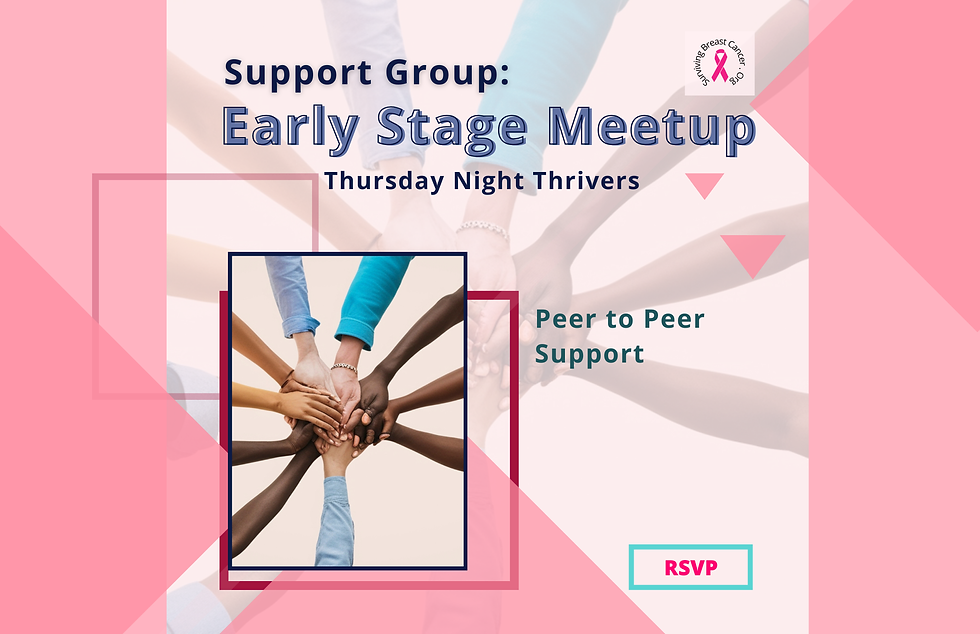Informed Patients Improve Fertility Outcomes: The Critical Role of Oncofertility and Genetic Counseling
- Laura Carfang, Ed.D.

- May 4, 2025
- 3 min read
Updated: Aug 26, 2025

In the realm of cancer treatment, discussions about fertility preservation are often overshadowed by the immediate focus on life-saving interventions. Yet, informing patients about their reproductive options is a vital part of comprehensive cancer care. The integration of fertility preservation discussions into the care continuum is essential not only for patients' emotional well-being but also for their long-term quality of life. When patients are well-informed, they are better equipped to make decisions that align with their personal desires and circumstances, ultimately improving fertility outcomes.
Listen Now on Breast Cancer Conversations Podcast:
257. What is Oncofertility? How To Navigate Genetics, Fertility and Cancer Care (click below)
The Importance of Fertility Discussions During Breast Cancer Treatment
Involving patients in decisions about their fertility risks and preservation options is a critical component of patient-centered care. Healthcare providers must take the initiative to ask the right questions and engage patients early in their treatment planning. Guidelines from the American Society of Clinical Oncology (ASCO) and the American Society of Reproductive Medicine (ASRM) have long advocated for informing patients at risk of infertility about their options. However, despite these recommendations being in place since 2012, a significant study conducted in 2020 revealed that only 44% of oncologists were providing this crucial information to their patients.
This gap highlights a systemic issue in cancer care, where time constraints, treatment urgency, and competing priorities can lead to fertility discussions being overlooked. Yet, these conversations are essential—they offer patients a sense of control during an otherwise overwhelming time and open the door for future family-building opportunities.
A Multidisciplinary Approach to Oncofertility Care
Addressing the issue of fertility preservation requires a multidisciplinary team approach. Oncologists, while primarily focused on treating the cancer itself, may not have the time or specialized knowledge to cover fertility risks in depth. Involving other healthcare professionals—such as social workers, nurse practitioners, fertility specialists, patient navigators, and genetic counselors—can ensure patients receive thorough and timely information.
Research shows that multidisciplinary involvement improves patient understanding. However, gaps remain, and one study found that while 60% of breast cancer patients were informed about fertility preservation, only 25% of those who met with a genetic counselor received relevant fertility information. This underscores a missed opportunity. Genetic counselors are uniquely positioned to discuss hereditary risks, reproductive planning, and fertility preservation options with patients facing complex medical decisions.
Addressing Disparities in Fertility Preservation Communication
Fertility preservation information is not always offered equally. Studies reveal that single women without children are more likely to receive fertility preservation counseling compared to married women or women over the age of 36. This bias can have serious implications for patients' reproductive futures.
It is essential for healthcare providers to recognize that every patient—regardless of marital status, age, or perceived likelihood of childbearing—deserves access to information about fertility preservation. A standardized, equitable approach ensures that no patient is denied the opportunity to make informed decisions about their reproductive future.
The Role of Tailored Resources and Genetic Counseling
Patients consistently express appreciation for clear, accessible, and tailored educational resources about fertility preservation. Online materials, decision aids, and personalized counseling sessions can significantly enhance patients’ understanding and confidence.
Genetic counselors, trained in delivering personalized support, can play a pivotal role. Beyond addressing inherited cancer risks, they can provide crucial guidance about fertility preservation strategies, such as egg or embryo freezing, ovarian tissue preservation, and considerations related to genetic testing of embryos.
By equipping patients with individualized resources and support, healthcare teams empower them to make informed choices that align with their values and life goals.
Empowering Patients Through Fertility Preservation Awareness
As cancer care continues to advance, fertility preservation must remain a central focus of comprehensive, patient-centered treatment. Empowering patients with knowledge and options not only improves fertility outcomes but also supports emotional resilience, reduces future regret, and enhances overall quality of life.
Fertility preservation is not merely a peripheral issue; it is a fundamental aspect of compassionate and holistic healthcare. Ensuring that patients have the information they need to shape their own futures is not just a matter of medical ethics—it is a commitment to honoring the dignity, dreams, and autonomy of every individual facing a cancer diagnosis.
If you or someone you love is navigating a cancer diagnosis, ask your care team about fertility preservation options. Early conversations can make all the difference.










